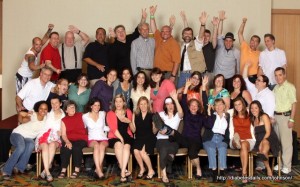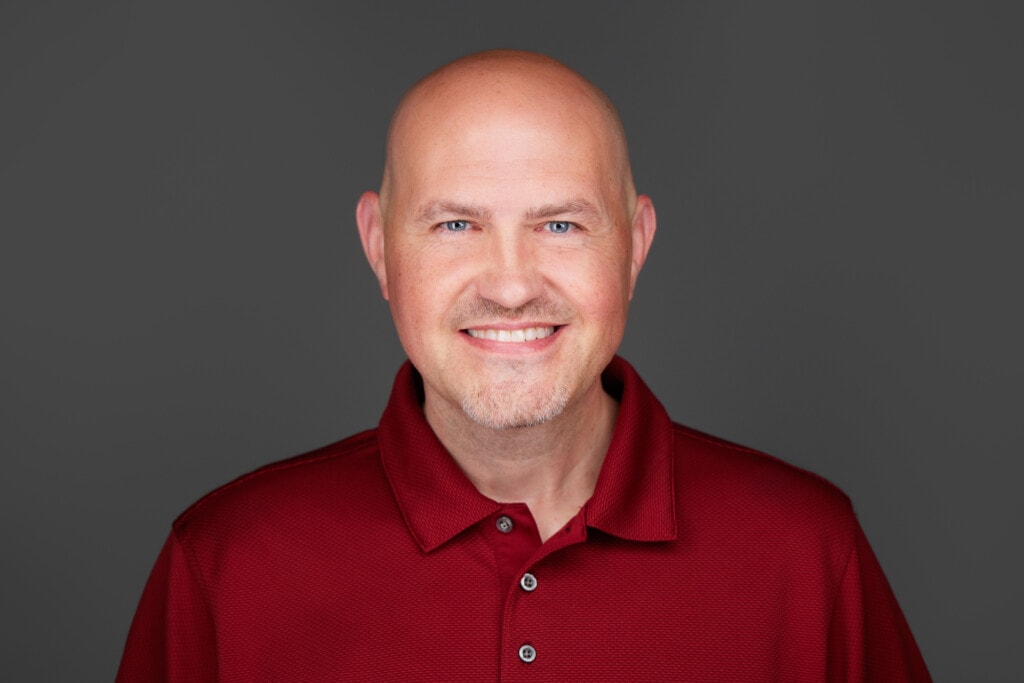Disclosure
In the spirit of full disclosure and transparency, Roche paid for my travel, lodging, and food for this trip. Roche did not ask anyone to blog about the summit, nor did they pitch any products to us. I stayed an extra 4 nights/5 days to attend CWD FFL. I paid for my own lodging and food (including diet sodapop, at $3/bottle) for those extra days. I also paid for my CWD registration fee, as well as transportation back to the airport on Sunday.
 Outcome From Last Year
Outcome From Last Year
Roche presented slides that covered what they learned from us last year, and what they’ve done with it. While many of these things are not highly visible to me as a blogger, it shows that they are invested in working with us, that they value our feedback, and that these summits are helping people with diabetes across the board in some way.
- Keep it real – they are now using people with diabetes in their advertisements and commercials. With real numbers (not always 104 mg/dl)!
- Address the costs of diabetes – They have a prescription discount card, lowering the co-pay for some test strips. They are also continuing to work their Patient Assistance Program by partnering with Direct Relief USA to get some testing supplies to those without insurance.
- Actively advocate for the patient community – Roche is working with the National Minority Quality Forum (NMQF) to found the Diabetes Care Project, which they describe as “a coalition of like-minded organizations focused on improving care for people with diabetes”. They are also advocating the adoption of additional industry standards in many areas of glucose monitoring.
- Help the community amplify its voice – They brought in representatives from the ADA and the AADE to listen to what we have to say.
I admit that I don’t know much about many of the above efforts, but assuming Roche was not just blowing smoke, it shows that they looked at our feedback and found some ways to make progress.
I try to keep in mind that a large company like Roche doesn’t have the ability to be very nimble and quick on its feet. Everything takes a long time to manifest from idea/concept to reality. Many of the above mentioned programs and tools existed already – so some would say that Roche is using them to convince us that they did something (blow smoke). Maybe so. But I would argue that our voice may have confirmed they were already on the right track, or allowed them to channel resources towards things we said were important to us.
 Accuracy Activity
Accuracy Activity
Meter accuracy is a pretty hot issue right now. We did an exercise which I believe had two purposes: to educate us on difficult decisions that consumers believe are easy, and to gather some feedback from us about where accuracy was most important (low, high, or even split).
We all want 100% accuracy 100% of the time, and we all said so. But I don’t think the average consumer understands the technical and scientific challenges. I don’t understand the complexity of it. It’s not all about keeping cost down, although that surely plays a considerable role – it’s really hard!
In the meantime, we are told that meter companies have a range of accuracy (15-20%, above 75 mg/dl) that they can reliably accomplish 95% of the time. They can “move” the range lower or higher, but can’t (or won’t?) tighten the range. So they have to decide where we want the most accuracy, low blood sugars or high blood sugars.
I have to ask if this issue, meter accuracy, is really the “right fight”? There is a lot to say around this. In fact, I’m going to stop myself here and revisit the topic in another blog post. Let’s just leave it at “I’m not sure” for now. Fair?
Our Time with the ADA
The loudest message of this session was nothing spoken. The intentions of the ADA were loud and clear; by sending some serious weight they showed that their reputation in social media is very important to them.
On the panel we had David Kendall, MD, Chief Scientific & Medical Officer and Lois Witkop, Senior Vice President Marketing Communications, as well as Dwight Holing, a volunteer PWD (type 1) serving on the 2010 board of directors (I really connected with Dwight), Amy Johnson, the 2010 National Youth Advocate, our own Dayle Kern (her personal twitter page), and Christine Feheley, both from the Communications team.
They listened to our feedback, and also shared some insights that many didn’t know. It seemed that our message was heard, and our desire to work together was well received. As many have already said, time will tell, and we’ll see what happens.
Our Time with the AADE
There was some gap in communication or misunderstanding somewhere, because they sent the wrong people. It was a waste of time, both sides sort of “butting heads”. We didn’t need to hear a PR pitch about what this organization offers its members. We wanted to talk about the life-threatening shortage of CDE’s which is only getting worse. I don’t think we got anything from them, nor them from us. It was frustrating.
My Conclusion
Do we know of ANY company, in ANY industry, that cares more about the people than the profits? Does the fact that diabetes is a profitable disease create conditions in the industry that encourage advancement and progress? What would we have if there was no incentive for companies to keep inventing and evolving the tools we all use? Where would we be if there were no incentives for all those smart people to work to better our lives? I’m just asking questions here. Cutting through the clutter, the bottom line of Roche is to make money. Just like any other
for-profit company. But getting a peek behind the “corporate curtain”, I can see that there are some really incredible people working for Roche, all of them trying to improve the lives of people with diabetes.
The bottom line for me? I got to see my friends. I got to see people I love very much, but don’t see often enough in real life. I got to know some incredible people at Roche, who I spent a lot of time with, both in the meetings and during the week at CWD, and I got to peek behind the curtain.
Time will tell whether this stuff continues to be valuable for everyone involved. I sure hope so, because I learn a lot every time. Things are not as simple as we consumers think they are (or should be), and it helps me align my perspective on life with diabetes when I get a slightly broader view of the big picture.


